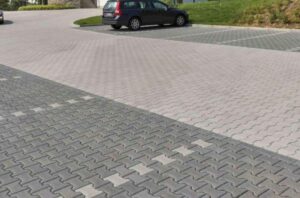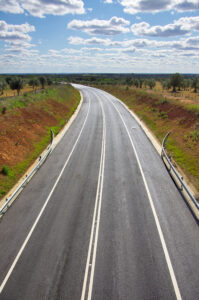How New Jersey’s Climate Impacts Asphalt Paving
New Jersey’s weather presents unique challenges for asphalt surfaces. From cold, snowy winters to hot, humid summers, the state’s fluctuating climate takes a toll on driveways, parking lots, and roads. For homeowners, a cracked or uneven driveway can be both unattractive and unsafe. For property managers, potholes in a parking lot create liability risks. And for municipalities, freeze-thaw cycles and heavy rain can shorten the lifespan of roadways.
Understanding how New Jersey’s climate affects asphalt paving is key to building durable, long-lasting pavement. With over 15 years of experience serving communities throughout the Garden State, NJPave has developed climate-specific paving solutions tailored to our region. As a trusted local paving contractor, we know how New Jersey weather impacts asphalt—and how to build surfaces that stand the test of time.
New Jersey’s Climate Challenges for Asphalt Paving
New Jersey’s climate is marked by hot, humid summers and cold, snowy winters, creating conditions that stress asphalt year-round:
- Freeze-Thaw Cycles: Repeated freezing and thawing in winter cause water to expand and contract beneath the surface, leading to cracks and potholes.
- Snow, Ice & Salt: Frequent snow removal and de-icing chemicals accelerate surface wear and oxidation.
- Heat & Humidity: High summer temperatures soften asphalt, while humidity can trap moisture in the pavement layers.
- Heavy Rain & Drainage Issues: Spring and summer storms bring heavy rainfall that tests drainage and can erode the base if not properly designed.
- Seasonal Temperature Swings: New Jersey experiences dramatic shifts between seasons—causing expansion and contraction that weakens asphalt over time.
While New Jersey doesn’t have the extreme altitude of Colorado, its moisture-heavy winters and humid summers create equally tough conditions. That’s why NJPave uses proven materials, drainage systems, and paving techniques designed specifically for our state’s environment.
How Temperature Extremes Affect Asphalt Performance
New Jersey’s climate subjects asphalt to both freezing winters and hot, humid summers—each presenting its own set of challenges.
- Freeze-Thaw Cracking: Melted snow and rainwater seep into tiny surface cracks. When temperatures drop, water freezes and expands, widening those cracks and creating potholes.
- Salt & De-Icing Damage: Salt and other chemicals used for snow and ice removal can corrode the asphalt surface and weaken its bond.
- Summer Heat & Oxidation: Prolonged exposure to sunlight and heat oxidizes asphalt, turning it from deep black to gray and making it brittle over time.
- Humidity & Water Infiltration: Humid air and frequent rainfall increase the risk of trapped moisture beneath pavement layers, which can cause stripping or soft spots.
- Drainage Challenges: Heavy spring rain or summer downpours test drainage systems. Without proper slope and grading, standing water weakens the sub-base and shortens pavement life.
NJPave designs and installs asphalt mixes and drainage systems specifically engineered for New Jersey’s seasonal extremes—ensuring performance, safety, and longevity.
Asphalt Installation Challenges in Hot Weather
New Jersey’s hot, humid summers can complicate paving projects. Asphalt is typically laid at 250–300°F, and high temperatures can slow cooling, making compaction more difficult. To ensure top quality:
- Timing Matters: NJPave schedules summer paving in the early morning or late afternoon to avoid excessive heat. Spring and fall offer the most favorable paving conditions.
- Mix Adjustments: We use polymer-modified asphalt mixes that resist softening in summer and stay flexible in colder months.
- Curing & Traffic Readiness: In hot weather, asphalt may need up to 72 hours to fully cure before allowing vehicle traffic. We protect the surface during this critical period for best results.
With careful scheduling and mix selection, NJPave ensures durable, smooth, and properly compacted asphalt even during New Jersey’s hottest days.
Cold Weather Paving Considerations
New Jersey’s cold winters are one of the biggest factors affecting paving. Asphalt installation requires both the ground and air temperature to be above 50°F for proper compaction and bonding.
- Avoiding Frozen Bases: Asphalt placed on cold or frozen ground cools too quickly, causing weak spots and air voids.
- Efficient Compaction: In cold weather, asphalt loses heat rapidly, shortening the working time. Our crews are equipped and coordinated to work quickly at the right temperatures.
- Warm-Mix Asphalt: When late-season paving is necessary, we use warm-mix asphalt to extend workability and achieve proper compaction in cooler conditions.
- Freeze-Thaw Preparedness: Our materials and installation methods are designed to resist cracking and moisture damage caused by New Jersey’s frequent freeze-thaw cycles.
Spring and fall often offer the best paving conditions—but with proper planning, NJPave can complete projects throughout much of the year while maintaining top-tier quality.
Moisture & Humidity: Hidden Threats to Pavement
In New Jersey, moisture—not just temperature—is a constant challenge. Rain, snowmelt, and humidity all affect asphalt’s strength and longevity.
- Base Layer Moisture: A strong, dry foundation is essential. Laying asphalt over a wet base can lead to stripping and poor bonding. NJPave ensures the sub-base is dry, stable, and properly compacted before paving.
- Freeze-Thaw Damage: Water that seeps into cracks freezes, expands, and reopens those cracks repeatedly through winter. Proper sealing and drainage prevent this.
- Curing & Timing: Humid air can slow curing and reduce compaction time. We plan carefully to ensure asphalt is compacted before it cools or traps moisture.
- Storm-Ready Planning: New Jersey’s heavy rainfall and rapid weather changes can delay paving. NJPave monitors forecasts and schedules projects strategically to avoid moisture-related issues.
The key to long-lasting pavement in New Jersey is proper drainage, base preparation, and moisture management—all core parts of NJPave’s process.
Rain, Snow, and Drainage Design in New Jersey
Rain and snow are constant realities in New Jersey, and water is asphalt’s biggest enemy if not properly managed.
- No Paving on Wet or Frozen Surfaces: We never lay asphalt over wet ground or standing water, which can cause steam pockets and poor adhesion.
- Weather Monitoring: New Jersey’s weather can change rapidly. Our crews are trained to pause during storms, protect in-progress work, and resume only under proper conditions.
- Engineered Drainage: NJPave designs every project with optimal grading and slope to direct water away from paved areas and prevent ponding.
- Preventive Maintenance: To combat long-term moisture damage, we recommend regular sealcoating and crack filling to protect surfaces from water infiltration and UV damage.
With NJPave’s expertise, your pavement will be built to handle New Jersey’s unpredictable mix of rain, snow, and humidity—year after year.
Climate-Specific Solutions by Experienced Professionals
New Jersey’s weather can be tough on pavement—but with the right approach, it doesn’t have to be. NJPave’s 15+ years of experience have shaped a proven system for building and maintaining durable asphalt surfaces in the Northeast.
Our Proven Approach Includes:
- Custom Asphalt Mixes for NJ Conditions: Designed to handle both hot summers and freezing winters, with polymer-modified binders for added flexibility and strength.
- Experienced Crews & Modern Equipment: Fully equipped with calibrated rollers, spreaders, and compactors for precise installation and consistent results.
- Smart Scheduling: We plan projects around seasonal weather patterns—often paving in early mornings, spring, or fall for the best results.
- Comprehensive Site Prep: A durable surface starts with proper grading, drainage, and compaction. We ensure the foundation is ready before paving begins.
- Preventive Protection: We offer UV-resistant sealcoating, crack filling, and maintenance programs to extend pavement life and reduce long-term costs.
- Local Knowledge: Our team understands New Jersey’s climate, soil, and weather patterns, allowing us to make informed decisions that protect your investment.
Proven Results Across New Jersey
From suburban driveways and retail parking lots to municipal roadways and HOA communities, NJPave delivers lasting results across the state. Our projects continue to perform year after year—proof of our commitment to quality, craftsmanship, and climate-focused paving solutions.



